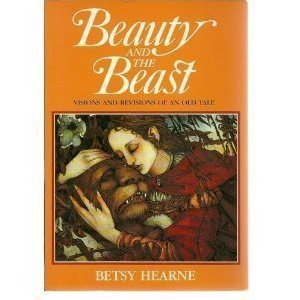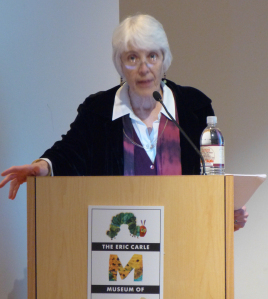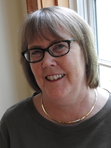Betsy Hearne: From Fireplace to Cyberspace: Folklore in Perspective
This past weekend at the Eric Carle Museum of Picture Book Art, Barbara Elleman, esteemed author, editor, curator, and founder of the museum’s Barbara Elleman Research Library, introduced her longtime friend and former colleague at Book List. Dr. Betsy Hearne has reviewed many, many books, written some impressive titles, and taught at the University of Illinois, all while spending about forty years studying one of her favorite folk tales, which she wrote about in Beauty and the Beast: Visions and Revisions of an Old Tale.
Betsy Hearne spoke of the tale’s roots beyond the familiar French ones, citing retellings of Eros and Psyche and still earlier Sanskrit texts. She discussed new versions and variations, most of which revolve around a father who changes as he gets old, a daughter who matures, and a beast who changes from outsider to be accepted or acclaimed. She mentioned that Beauty is usually at the center, while the beast is often the most riveting in artistic terms.
She sees this as a feminist story, since Beauty saves two relatively passive males, reversing gender roles. “The Beast sets a good table and waits, shows patience and respect for Beauty’s feelings. He’s learned through humbling experience that life without affection is a thorny paradise, even fenced with roses.”
She mentioned how myths have informed her own creative writing: sometimes consciously drawing on folklore for stories about selkies or spells, and sometimes realizing only afterward the influence of myth in work with a contemporary setting. She drew some from some family memories to write the novel Wishes, Kisses, and Pig, but when she’d finished it, realized the influence of tales about wishing on a star and three wishes gone wrong. Her picture book, Seven Brave Women, uses the sort of repetition that makes some folktales memorable.
She ended her talk speaking of the theme of transformation, suggesting how both storytellers and children borrow from different myths, connect the past and present, as all of us make stories. “Metamorphosis of reality begins in the imagination,” she said, ending with a tribute to The Very Hungry Caterpillar, which she called “a test of fortitude ending with new wisdom.”













